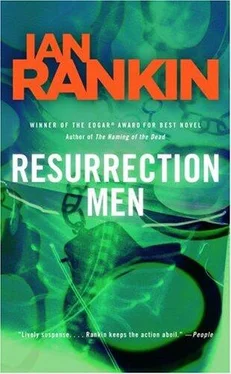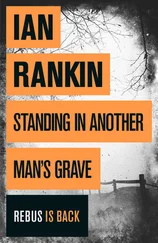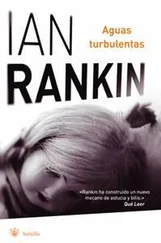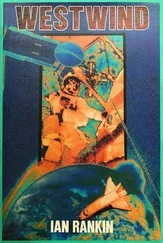It was like a Polaroid developing in front of him — Rebus saw the full picture now. “You’ll do a trade with the Weasel?”
“That’s what we’re hoping.”
Rebus was thoughtful. “He still won’t go for it.”
“Then Aly’s going down. Could be a long one, too.”
Rebus looked at him. “How much stuff did you catch him with?”
“We thought it would be best if we showed you.”
Which was just what they did.
West Edinburgh, a commercial estate just off Gorgie Road. The place had seen better days. Rebus got the idea the only growth industry would be in security — protecting vacated premises from vandalism and arson. The warehouse was ringed by a chain-link fence, twenty-four-hour guard detail on the gate. Rebus had been there before, years back: a weapons haul in the back of a truck. The truck inside the warehouse this time round didn’t look so different, except that it had been stripped, many of its component parts laid out in order on the concrete floor. Doors and panels had been unbolted and unscrewed. All the wheels had been jacked up and removed, their tires taken off. A couple of boxes provided a makeshift step. Rebus climbed up and peered inside the cab. The seats weren’t there, and the flooring had been sliced away to reveal a secret compartment, now empty. Rebus climbed down again and walked around the back of the lorry to where the haul now lay, the whole lot displayed on a length of light-blue tarpaulin. Not all the packages had been opened as yet. A chemist — one of the forensics crew from the labs at Howdenhall — was working with test tubes and solutions. He’d dispensed with the white coat and was dressed for the cold in a bright-red ski jacket and woolen tammy. He’d labeled about half the clear-wrapped packets. There were maybe fifty left to go through . . .
Nearby, Ormiston was snuffling again. Rebus turned to Claverhouse, who was warming his hands by blowing on them. “Better watch Ormy doesn’t get too close to the drugs. He could end up hoovering the lot.”
Claverhouse smiled. Ormiston muttered something Rebus didn’t catch.
“It looks like a fair haul,” Rebus commented. “Who ratted him out?”
“Nobody. We got a lucky break, that’s all. Knew Aly had been doing a bit of dealing.”
“You’d no idea he was shifting quantities like this?”
“Not a scooby.”
Rebus looked around. It was much more than a fair haul; they all knew it. Bulk like this, it was a PR coup. Yet there was nobody here but himself, the two SDEA men and the chemist. Drug runs from the Continent were usually a job for Customs and Excise . . .
“It’s aboveboard,” Claverhouse said, reading Rebus’s face. “Carswell gave us the nod.”
Carswell was the assistant chief constable. Rebus had had run-ins with the ACC before.
“Does he know about me?” he asked.
“Not yet.”
“Let’s see if I’ve got this. You stopped a lorry, found a heap of illegal substances. It’s enough to put the Weasel’s son away for ten years . . .” He broke off. “How does the Weasel’s son tie in exactly?”
“Aly’s a lorry driver. Long-distance a specialty.”
“You were tailing him?”
“We just had an inkling. Arsehole was smoking a joint in a rest area when we stopped him.”
“No Customs involvement?”
Claverhouse shook his head slowly. “Stopped him on spec. Docket showed he’d been delivering computer printers to Hatfield, bringing back a load of software and computer games.” Claverhouse nodded towards the far corner of the warehouse, where half a dozen pallets sat. “Aly started shitting it the minute we introduced ourselves . . .”
Rebus watched the chemist pouring himself some tea from a flask. “And you want me to do what exactly? Talk to his dad, see if I can fix a deal?”
“You know the Weasel better than we do. Maybe he’ll listen to you. Just two fathers having a little chat . . .”
Rebus stared at Claverhouse, wondering how much the man knew. A little while back, when Rebus’s daughter had been put in a wheelchair, the Weasel had found the culprit, handed him over to Rebus in a warehouse not unlike this one . . .
“Can’t do any harm, can it?” Claverhouse’s voice was a soft echo, bouncing off the corrugated walls.
“He won’t shop Cafferty,” Rebus said quietly. But his own words lacked the power to resonate like Claverhouse’s.
Lateral thinking.
It had been Davie Hynds’s idea. Interviewing the deceased’s friends and business acquaintances was all well and good, but sometimes you got a clearer picture by going elsewhere.
“Another art dealer, I mean,” he’d said.
So Siobhan and Hynds found themselves in a small gallery owned by Dominic Mann. It was located in the city’s west end, just off Queensferry Street, and Mann hadn’t been there long.
“Soon as I saw the place, I knew it was a good location.”
Siobhan glanced out of the window. “Bit of a backwater for shops,” she mused. Offices to one side, a solicitor’s to the other.
“Not a bit of it,” Mann snapped. “Vettriano used to live quite near here. Maybe his luck will rub off on me.”
Siobhan was looking puzzled, so Hynds stepped in. “I like his stuff. Self-taught, too.”
“Some of the galleries don’t like him — jealous, if you ask me. But as I always say, you can’t argue with success. I’d have represented him like a shot.”
Siobhan had turned her attention to a nearby painting. It was bright orange, titled Incorporation, and priced at a very reasonable £8,975, which was just a shade more than her car had cost. “How about Malcolm Neilson?”
Mann rolled his eyes. He was in his mid-forties, with bottle-blond hair and a tight little two-piece suit in a color Siobhan would have called puce. Green slip-on shoes and a pale-green T-shirt. The west end was probably the only safe place for him. “Malcolm is a nightmare to work with. He doesn’t understand words like ‘cooperation’ and ‘restraint.’ ”
“You’ve represented him then?”
“Only the once. A mixed show. Eleven artists, and Malcolm quite ruined the private view, pointing out imagined defects to the clients.”
“Does anyone represent him now?”
“Probably. He still sells overseas. I imagine there’s someone somewhere taking their cut.”
“Ever come across a collector called Cafferty?” Siobhan asked innocently.
Mann angled his head thoughtfully. “Local, is he?”
“Fairly.”
“Only he sounds Irish, and I have a few enthusiastic clients in the Dublin area.”
“Edinburgh-based.”
“In that case, I can’t say I’ve had the pleasure. Would he be interested in joining my mailing list?”
Hynds, who had been flicking through a catalogue, closed it. “I’m sorry if this sounds callous, sir, but would Edward Marber’s demise benefit other art dealers in the city?”
“How so?”
“Well, his clients will have to go somewhere . . .”
“I see what you mean.”
Siobhan locked eyes with Hynds. They could almost hear the working of Dominic Mann’s brain as the simple truth of this hit home. He’d probably be busy late into the evening, enlarging his mailing list.
“Every cloud,” he said at last, not bothering to finish the sentence.
“Do you know the art dealer Cynthia Bessant?” Siobhan asked.
“My dear, everyone knows Madame Cyn.”
“She seems to have been Mr. Marber’s closest friend.”
Dominic Mann appeared to pout. “That could be true, I suppose.”
“You don’t sound too sure, sir.”
“Well, it’s true they were great friends . . .”
Siobhan’s eyes narrowed. There was something Mann wasn’t saying, something he wanted to have prized out of him. Suddenly he clapped his hands.
Читать дальше












